
Tribune (228)
A Game of Thrones for the Palestinian Authority
Written by Shehab Al Makahleh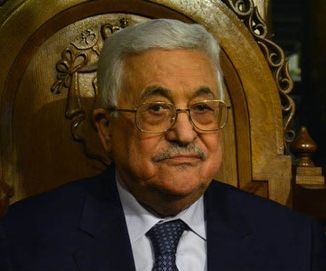 President Mahmoud Abbas seems to be on his way out as the leader of the Palestinian Authority. Who will take his place?
President Mahmoud Abbas seems to be on his way out as the leader of the Palestinian Authority. Who will take his place?
Palestinian politics today is undergoing a change as President Mahmoud Abbas’ health condition deteriorates. With no clear heir to ensure a landslide victory, the question over who will replace Abbas remains unanswered. The possible successors are a source of argument among the Palestinians and the international community. Currently, speculation centers around four names.
Among them is Mahmoud al-Aloul, the first vice president of Fatah. Abbas himself supports Aloul to be his successor to lead the Palestinian Authority (PA). However, Aloul is not a welcome choice for some Arab countries because he is hawkish and opposes the two-state solution. Sources have stated that Fatah’s General Councildecided in March to change the party’s internal constitution in order to appoint Aloul as the acting leader for three months if Abbas’ health affects his ability to rule. Israel is also concerned about the succession, as a PA power vacuum could lead to further violence.
The second candidate in the race is Jibril Rajoub, a former West Bank security chief and a senior Fatah figure. He served as head of the Preventive Security Force in the West Bank until 2002, after which then-PA President Yasser Arafat appointed Rajoub as his national security adviser in 2003. Rajoub believes he is the most suitable candidate to lead the PA after Abbas.
The third candidate is Mohammed Dahlan, a former Gaza security mastermind who was forced to flee Ramallah in 2011 following allegations of corruption and an attempted coup against Abbas. It is said that Elliot Abrams, a National Security Council adviser during the George W. Bush administration, nominated Dahlan to lead the PA mission against Hamas in Gaza in 2007, which earned him the warlord moniker. While in exile in the United Arab Emirates, Dahlan was accused of sending money to some Fatah members in Gaza to undermine Abbas’ authority in Ramallah, the headquarters of the PA. Dahlan had always opposed Islamist movements in the West Bank and the Gaza Strip, including Hamas, and is waiting for the right moment to return to the West Bank as president.
The fourth candidate is Nasser al-Kidwa, the nephew of Yasser Arafat and senior Fatah official. Kidwa has served as the Palestinian foreign minister and envoy to the United Nations. He is the most likely candidate to win the presidential race as he is supported by the Arab Quartet that includes Jordan, Egypt, Saudi Arabia and the United Arab Emirates.
Possible Scenarios
There are three possible scenarios in the coming months to replace the aging Abbas, as per NPR. The first option, if Abbas is no longer able to uphold his office, is that the speaker of the Palestinian National Council, Aziz Dweik (who is a member of Hamas but is based in the West Bank) would replace Abbas for 60 days until elections are held. The second is for Abbas himself to select a temporary replacement until the elections. The third is to set a date for elections where the four candidates would nominate themselves, unless a tectonic change takes place at the very last moment, such as a new intifada in Gaza and the West Bank.
The first option is unlikely to happen because Dweik is a member of Hamas. Abbas will not cede power to a rival organization due to internal and regional complications and ramifications. Thus, Dweik could not take over the Palestinian leadership unless the US, Israel and other regional powers suddenly back Hamas, which Washington, Tel Aviv and the European Union classify as a terrorist organization.
As for the second alternative, Abbas would select a person close to the PA leadership to rule for a transition period before the election date is set. The selected leader will also have a chance to nominate himself as leader of the PA in the presidential elections. This would be Arafat’s nephew, as he was backed by regional and international powers, including the US and Israel, when he served as foreign minister. This can lead to the third scenario in which the temporary president of the PA could become a candidate and winner in the presidential elections.
Since 2016, Arab leaders have looked for an alternative to Abbas. That same year, they spoke to Abbas personally on his 81st birthday when they congratulated him and wished him good health. At the time, Jordanian King Abdullah II and Egyptian President Abdel-Fattah el-Sisi were in charge of an Arab initiative to seek out a successor. The UAE and Saudi Arabia, meanwhile, had sent their representatives to Ramallah to discuss the issue directly with Abbas, as the leaders of both nations did not want to see a power vacuum in the political arena of the PA.
Critical Time
In December 2017, after US President Donald Trump recognized Jerusalem as the capital of Israel, Kidwa said that any protests by Palestinians should be conducted “in a peaceful and an unarmed, sustainable way, so that would lead to serving the Palestinian national cause in this regard.” His moderate stance toward the American decision is one reason why he is favored by many countries, unlike his rivals who call for escalation.
The move of the US Embassy from Tel Aviv to Jerusalem on May 14 is deemed critical to the coming Palestinian leadership, whoever the candidate will be. However, the tough rivalry among the candidates, mainly between Rajoub and Dahlan, will only increase in the coming months, preventing both from heading the PA.
With the start of Ramadan, it is expected that Palestinians will try to raise the question of Jerusalem as a core issue not only for them, but for Muslims and Christians as well. Thus, we might witness a kick-off of a new uprising in Gaza and the West Bank, of which the violence against Palestinian protesters on the border with Gaza on May 14 could become a tragic preview. This could lead to either Aloul or Kidwa winning the race for the PA presidency based on their wide national support.
The PA presidential race is critical. The next president will be accountable for establishing an independent Palestinian state with East Jerusalem as its capital, while ensuring its peoples’ right to self-determination. The president will be working with Arab and Muslim leaders to secure the status of the holy shrines in East Jerusalem as part of the capital of an independent Palestinian state, without offending Jewish holy sites in the city. That is why the best solution for the issue of Jerusalem is to divide it into West and East capitals, for Israel and Palestine respectively, to avoid any future regional war.
Article published in Fair Observer: https://www.fairobserver.com/politics/palestinian-authority-succession-fatah-mahmoud-abbas-gaza-west-bank-middle-east-news-76251/
Russia seeks win-win Middle East peace deal
Written by Maria Dubovikova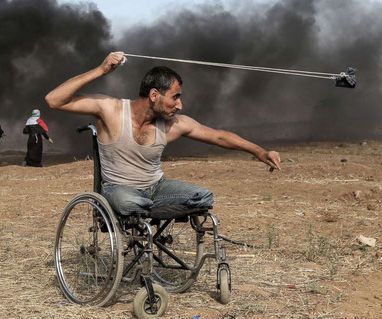 Since 1948, Russia has been an advocate of the two-state solution and has been pushing both Arabs and Israelis to resolve the Palestinian-Israeli conflict in accordance with this plan, leaving Jerusalem for the final talks. Recently, Russia has started to exert more pressure on Israel to cease building new settlements in the occupied West Bank. This has been clear from the many statements issued by the Russian Foreign Ministry expressing deep concern at the deteriorating situation when it comes to Israel’s settlement projects.
Since 1948, Russia has been an advocate of the two-state solution and has been pushing both Arabs and Israelis to resolve the Palestinian-Israeli conflict in accordance with this plan, leaving Jerusalem for the final talks. Recently, Russia has started to exert more pressure on Israel to cease building new settlements in the occupied West Bank. This has been clear from the many statements issued by the Russian Foreign Ministry expressing deep concern at the deteriorating situation when it comes to Israel’s settlement projects.
Why Moscow is pushing for the two-state solution and for the procrastination of the status of Jerusalem can be explained by Russian fears that a lack of progress in the peace process could result in unilateral steps that would undermine the prospects of resolving the conflict. In other words, Russia is concerned about the liquidation of the Palestinian cause.
If the superpowers of the US and Russia do not have the sincere will to reach a solution, it would lead either to seriously harming the Palestinian cause or to the spreading of extremism in the region. Russia seeks to achieve a win-win deal for both Israelis and Palestinians rather than a win for one party at the expense of the other.
The announcements by the US of recognizing Jerusalem as the capital of Israel and moving its embassy there were deemed by Russia as a blow to all peace attempts, driving the whole region toward a direct clash.
With the increased tension between Iran and Israel in Syria and the failure so far to eradicate terrorism from Syria and Iraq, as well as other countries in the region, there is great potential for further conflict if the stalemate in the peace process continues and if new settlements continue to be built. The Israeli government has, in the past few months, approved plans to build 1,100 new units in 20 settlements in the West Bank. This not only undermines the whole peace process, but it is also a blatant attempt to wipe out Palestinian identity.
Why has the Russian position toward Israel changed in the past few years? It is a result of the shifting Israeli perspective on the peace process, which was supposed to solve the conflict and declare an independent Palestinian state many years ago.
Russia alone cannot solve the Palestinian-Israeli conflict — it needs regional cooperation and support from the EU and of course, the US.
– Maria Dubovikova
When the region’s leaders make official visits to Moscow, their meetings with President Vladimir Putin touch on bilateral relations. However, Putin also insists on discussing the Palestinian-Israeli conflict which, if it remains unresolved, will lead to further skirmishes throughout the Middle East.
During his trip to Moscow this month, Israeli Prime Minister Benjamin Netanyahu was told by Putin that the issue of Jerusalem should only be determined in final status talks and that the two-state solution is the best way to avoid any spillover to neighboring countries.
As Russia adheres to the UN resolutions on the principles of a peaceful settlement, including the status of East Jerusalem as the capital of the future Palestinian state, Moscow seeks the leeway to bring both sides together in a conference similar to that in Sochi for Syria. It is hoped these direct negotiations would help the two parties reach appropriate agreements.
But clearly, Russia alone cannot solve the Palestinian-Israeli conflict — it needs regional cooperation and support from the EU and of course, the US. Only concerted efforts can bring peace to the region and solve the complicated conflict in a manner that leads to co-existence in two states where both peoples respect each other and cooperate for the betterment of their nations.
Article published in Arab News: http://www.arabnews.com/node/1307581
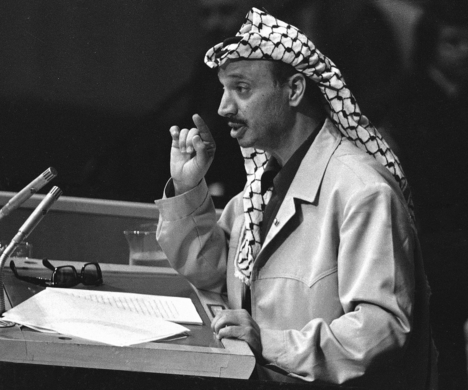 Forty five years passed since the 1973 first Geneva Conference for Peace between the Arab Countries and Israel. A lot of talks took place by then to find a way for the inclusion of the PLO in that Conference directly or indirectly. The Palestinian National Council of 1973, and 1974 eleventh and twelfth sessions were both an attempt in that direction when they decided to create a “ Palestinian National Authority in any part of Palestine to be liberated”. This program signaled the PLO move from the Liberation of all Palestine strategy, to another one that speaks about liberation in stages, opening the way to the recognition of Israel in the 1988 PNC conference. The 1973-1974 change gave PLO the Arab recognition as the sole representative of the Palestinian people which took place in the Arab Summit held in Rabat in 1974, and it also opened the UN doors to Yasser Arafat to give his famous speech” I came to you with an olive branch in one hand, and a gun in the other. Do not let the olive branch fall from my hand”, and he repeated the last sentence. Besides that the PLO started engaging with some European countries like France.
Forty five years passed since the 1973 first Geneva Conference for Peace between the Arab Countries and Israel. A lot of talks took place by then to find a way for the inclusion of the PLO in that Conference directly or indirectly. The Palestinian National Council of 1973, and 1974 eleventh and twelfth sessions were both an attempt in that direction when they decided to create a “ Palestinian National Authority in any part of Palestine to be liberated”. This program signaled the PLO move from the Liberation of all Palestine strategy, to another one that speaks about liberation in stages, opening the way to the recognition of Israel in the 1988 PNC conference. The 1973-1974 change gave PLO the Arab recognition as the sole representative of the Palestinian people which took place in the Arab Summit held in Rabat in 1974, and it also opened the UN doors to Yasser Arafat to give his famous speech” I came to you with an olive branch in one hand, and a gun in the other. Do not let the olive branch fall from my hand”, and he repeated the last sentence. Besides that the PLO started engaging with some European countries like France.
Yet, these changes of the 1973-1974 were not enough for United States and Israel to accept the inclusion of the PLO in the so called” Peace Process”. This inclusion had to wait for the Americans till 1988 when PLO recognized the UN Security Council Resolution 242 during the PNC 16th conference held in Algeria by then. After that conference an American dialogue with the PLO started, and the American Ambassador to Tunisia Robert Pelleatru was appointed to conduct it. Without delving in too much details, the rest of the story is known starting from Madrid Conference of 1991 when PLO participated as part of a joint Jordanian- Palestinian delegation, followed by eight sessions of “ corridor meetings” aiming to agree on the agenda before interning the negotiations room. These sessions were held in Washington between the Palestinian delegation that was led by the late Haidar Abdel Shafi the well known Palestinian National Personality from Gaza, and the Israeli one led by Lawyer Elyakim Rubenstein. The sessions were stopped without entering the negotiations room. This stoppage took place after Oslo Declaration of Principles was released as a result of secret direct talks that took place between Israel and the PLO. Since Madrid conference of 1991, 27 years already passed, and 25 are almost passed since Oslo. Palestinian wise the harvest was bitter.
The colonial settlements grow bigger more than six times, during the “ peace process”. Jerusalem got fully separated from the other parts of the Palestinian 1967 territories, and almost Judaised except the Old City and some other few communities. The Refugees issue is taken in practical terms out of the table by Israel and the United States. Last but not least Area C became De facto annexed to Israel if not De Jure yet, and Jerusalem annexed territory to Israel is still growing by grabbing parts of West Bank, and adding them to Jerusalem. The outcome of all of this is a creeping annexation as it was first called by Moshe Dayan in the end of 1960’s, and the creation of one bigger Israel that have no place for the Palestinians. What will be the next step towards those ignored Palestinians?. Some in Israel are raising their voices calling for their transfer, in other hand the official Israeli Policy is keeping silent about their fate, but at the same time supporting those who call for the transfer of the Palestinians by taking no single step against their statements and actions.
This is a summary of the bitter harvest so far, which is also an indication that the worse is still to come. Why is that?
The main reason is the formula that was used for peacemaking and conflict resolution between the Palestinians and the Israelis. I published a long research paper about this formula in the “ International Negotiation Journal” last January 2018, titled “Beyond Exacerbating Asymmetry, and Sustainig Occupation”. Here is a brief summary of the findings about the conflict resolution formula that was adopted by the United States and Israel towards our case:
First: Despite the grief asymmetry between the two sides( The occupier and the occupied). They were considered to be symmetrical. “ You will get if you give”. ( Netanyahu).
Second: The process dealt with West Bank, Gaza Strip and East Jerusalem as the subjects of bargaining and division between the two sides. This approach led to the marginalization of the Palestinian refugees issue, and other issues like the Palestinian rights in West Jerusalem.
Third: The Process was gradual, and incremental, so the discussed details will open the way to other endless kind of details leading as such to the failure of all the negotiations rounds.
Fourth: Instead of agreeing in advance about the end game( The goal of the Negotiations), the final status was kept as an “ open ended”, and the core issues including of Jerusalem, refugees, settlements and borders were left to the permanent status negotiations that its rounds failed one after the other, while settlments were growing in the ground.
Fifth: The mediator was biased to the strong side all the way ahead. In the times of President Donald Trump the mediator moved to a worse position of becoming a partner to Israel in settlement expansion, and in Judaizing Jerusalem.
Sixth: The formula for the negotiations was based on “ Ignoring the past, and looking together for the future”. That was adopted instead of reconciling and solving the atrocities of that past.
Seventh: The formula included a People to people approach which ended up becoming the hub for “ technical” and “ business like” projects with a lot of bearucracy in reporting and the quality of reporting included from the donors side. This was accompanied by an assumption by the donors that the two sides moved to a stable “post- Conflict period” of partnering in making solutions, therefore institutional building became the fashion instead of the continuation of the support for the Palestinian non- violent struggle for self determination and independent statehood. Neo- Colonial tools of control was included as research explicated.
In brief, a commercial formula of compromise prevailed either by looking politically for the division of the 1967 occupied territories between the two sides, or by doing business together through the so called” people to people projects”.
The bitter harvest of this formula is ahead of our eyes. Accordingly it should be said clearly: Goodbye to conflict resolution with all its shortfalls, and look instead for reconciliation. The conditions of the latter do not exist in the ground today, but an international formula of non violent struggle for the emancipation of the Palestinian people can create the conditions for it instead of focusing solely on diplomacy.
Article published in Akhbar el Balad: http://akhbarelbalad.net/ar/1/6/3944/
Photo credit: AP
Why the non-armed Palestinian struggle is also "illegitimate"
Written by Walid Salem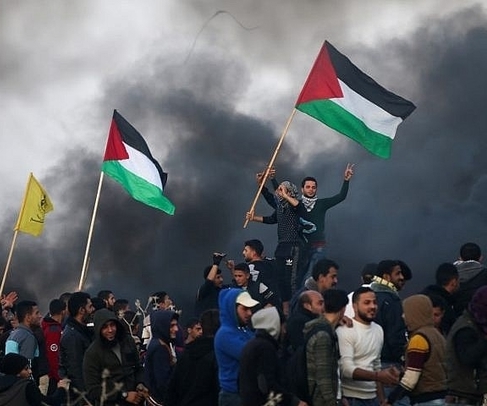 In response to the savage massacre committed by the Israeli Army against the “ Marches of Return and Seige Lifting” of yesterday in Gaza, the White House in Washington DC released a statement blaming Hamas for using violence, and supporting the “ right of Israel to defend itself”. Also Mr Jason Greenblat the American Envoy to the Middle East “ Peace process” wrote an article in the Israeli newspaper “ Yisrael Hayoum” accusing Hamas of returning Gaza back to the “ Iron Age”
In response to the savage massacre committed by the Israeli Army against the “ Marches of Return and Seige Lifting” of yesterday in Gaza, the White House in Washington DC released a statement blaming Hamas for using violence, and supporting the “ right of Israel to defend itself”. Also Mr Jason Greenblat the American Envoy to the Middle East “ Peace process” wrote an article in the Israeli newspaper “ Yisrael Hayoum” accusing Hamas of returning Gaza back to the “ Iron Age”
Till Nine PM yesterday evening, the death toll among Gaza Palestinians participating in the Marches reached the number of 55 (increased to 58 by 1:26 am this morning), in addition to 2410 injured. According to the Ministry of health in Gaza, there are 203 children and 78 women among the injured. 40 of these were in a critical conditions and 76 seriously injured. 1204 got injured by live bullet, and 130 by rubber covered metal bullets. Further than that the Ministry of health report includes calculations about the parts of the bodies that were injured, for instance 79 injured in the neck and the head, 76 in thier chests and stomaches, 164 in different places of their bodies, and 1055 in the lower parts of their bodies. As such many of the injured will be left with permanent disabilities life long.
How comes that these killings and injuries just in one day are merely practiced in the framework of “ Israel right to defend itself”?. How comes that later in the day the USA prevented a UN Security Council Statement approved by the other 14 members of the Council condemning the massacre and calling for the formation of an international committee of investigation about them?.
Beyond the shock from these positions, three issues should be emphasized (among others that there are no enough space for all to be discussed in a short column like this one):
The first among these is that United States is not any more just a supporter to Israel politically and militarily, but moreover United States is a partner in the Israeli ongoing settler colonial project in the ground. A latest research had shown that 15 percent of colonial settlers in West Bank (without East Jerusalem) today are Americans. Sara Yael Hirschhorn from Oxford University presented these results showing that there are sixty thousand settlers in West Bank only ( without the inclusion of East Jerusalem), who are originally Americans. Therfore President Abbas was fully right to describe the move of the American Embassy yesterday to Jerusalem as “ an establishment of an American Settler outpost in Palestine”. This is one.
Secondly, the significant point regarding the move of the American Embassy to Jerusalem yesterday, is that it is about dictation of the final status results in the ground in contradiction with Oslo Agreement article five text which stated that Jerusalem as a whole ( East and West) is subject to the final status negotiations. In other words Oslo Agreement included what the late Palestinian leader Faisal Husseini was saying all the time till he passed away in 2001, that the Palestinians property rights in West Jerusalem should be negotiated and agreed upon before any political agreement about the city and on how to share two capitals for two states in it. The Americans violated this article and adopted the Israeli position which again makes the American Embassy in Jerusalem of a colonial type as mentioned above.
Thirdly: The American Administration becoming a partner of the Israeli settler colonial project, will share as well the Israeli position of finding no place to the Palestinians within this project. Accordingly the Palestinians should hide and show no presence, expressed by keeping fully silent towards what is imposed and dicatated, or they will pay the price by getting to be” removed” forcefully when they oppose. In this sense all kind of Palestinian struggle armed and non- armed become illegal according to this perspective because they make the Palestinian visible while he / she is supposed to be invisible. Adi Ophir wrote once and again that the Palestinian is punished not because he made something wrong, but he/she is punished becsuse he/ She is found in a place where the settler colonial project expect him/ her not to be existing in. Gaza wise this means that the Gazan Palestinians should continued acting in impotent way despite the move of the Embassy, and despite the anniversary of 70 years of the Nakba given also that 66 percent of Gaza residents are refugees according to the Palestinian Bureau of Statistics new report released yesterday.
It was James Zughby who wrote yesterday that the the Americans consider the Palestinians as” invisible victims” that do not count anything by themselves, but they merely represent a “ problem to Israel” that the latter has to deal with and solve. Accordingly no attention will be made to the plight of the Palestinians since 1948.
Article published in Akhbar el Balad: http://www.akhbarelbalad.net/ar/1/6/3933/
Photo credit: AFP Photo/Mohammed Abed
Disputes over Iraq and Syria: Strategies and ramifications
Written by Shehab Al Makahleh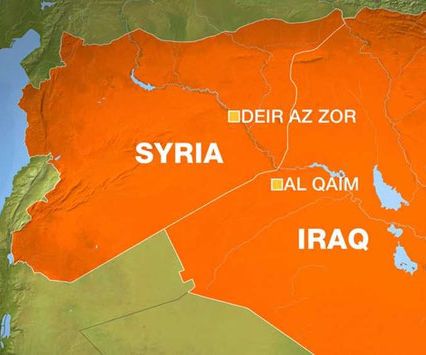 Disputes in the Middle East cannot be resolved unilaterally. They can only be tackled collectively, through integrated regional and international cooperation. This applies to challenges such as the Palestinian cause, terrorism, Arab-Iranian conflict and other lesser predicaments.
Disputes in the Middle East cannot be resolved unilaterally. They can only be tackled collectively, through integrated regional and international cooperation. This applies to challenges such as the Palestinian cause, terrorism, Arab-Iranian conflict and other lesser predicaments.
Some political observers believe that the Arab-Iranian dispute should be addressed even before the Palestinian-Israeli issue. Since 1967, the Middle East has been a hub for the worst military conflicts and wars.
About 22 percent of world’s conflicts have been concentrated in the region during the past three decades. When the eight-year Iraqi-Iranian went on from 1980 to 1988, both countries lost more than 2 million soldiers.
UN statistics reveal that about 40 percent of the total number of those killed in armed conflicts have fallen in the Middle East since 1980 until the end of 2017. Such conflicts have complicated the political scene and have led to further chaos when the Arab Spring erupted in some Arab republics.
Up to 72 percent of world war toll and military conflict fatalities have been reported in the Middle East. Moreover, the Middle East has the highest levels of terrorist attacks since 2003. Incidents of terrorism increased by 50 percent, leaving many countries behind owing to their impact on economies.
Iran and Arab states are heading toward direct regional conflict that would drive Israel to intervene by targeting some strategic sites in Iran to turn balance of power
– Shehab Al-Makahleh
Balance of power
Many states harbor a strong belief that their main enemy is Iran as it tampers with the stability of Arab countries. This started with Iraq, Lebanon, Yemen and Syria. Since no conflict can take place without the pretext, if the root cause is to be resolved then changing the balance of power and the regime in Iran are a must.
As Iran was eying Iraq since 1980s, after regime had changed in Tehran in 1979, a conflict broke out which saw in the Iranian expansionist policies a strategy to rule over the whole region.
The first Iranian step was to control Iraq after American pullout because Iraq is in the north of the Gulf and Iran is located to the east of the Gulf States.
This is likely to pose a major threat to Gulf states as Iraq is geographically and strategically located between three major powers: The Gulf Cooperation Council (GCC) states, Turkey and Iran.
Iranians have sought to play the Iraq card first before moving to play other cards which include sectarianism, the cards of Syria, Lebanon and Yemen. Iran believes that an Arab-Iranian model can be created through the Iraqi gate, with the support of others – such as Russia, Syria – without reaching a compromise between Arabs and Iranians in such a conflict.
There is a firm belief that the Iranian regime should be changed in order for the country’s policies to be changed accordingly. Hence, changing the regime of the Vilayat al-Faqih may be considered a regional and international necessity before the possibility of confluence of Iraq and the other Gulf states in the form of an alliance or to form a new regional system.
No peace deal
But why all previous wars have ended with no peace deal or surrender agreement? The Iran-Iraqi war ended on August 8, 1988 with a truce but without a peace or surrender agreement being signed. The same applies to the two wars against Iraq.
Thus, the answer is simply tacit which bears the seeds of a war that would erupt any moment. Should this happen, Iran will be forced to leave Iraq and Syria to protect its borders.
Iran looks at Arabs, whether Sunni or Shiite, from a heritage perspective. It considers the GCC a springboard backed by the West to besiege Iranian revolution.
On the other hand, Gulf Arabs regard the Iranian revolution as an existential threat. This was exemplified by Khomeini who called on Arabs in the Gulf to stir up revolution.
Iran and Arab states are heading toward direct regional conflict that would drive Israel to intervene by targeting some strategic sites in Iran to turn balance of power. The month of May is very critical where the future of the Middle East region will be at stake.
Article published in Al Arabiya: https://english.alarabiya.net/en/views/news/middle-east/2018/05/11/Disputes-over-Iraq-and-Syria-Strategies-and-ramifications.html
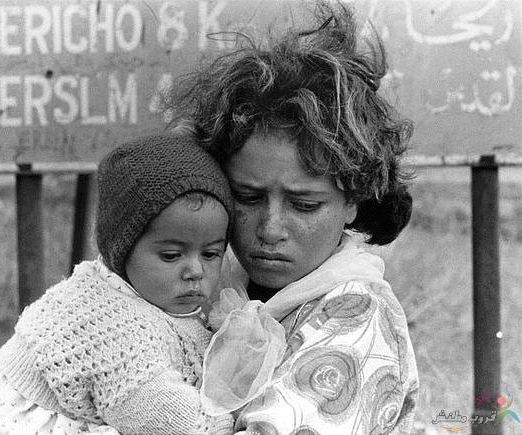 This year witnesses the seventieth anniversary of 1948 Nakba. In the 1980’s the Israeli New Historians found out what Walid Al Khalidi and others discovered since 1960’s that the Palestinians did not leave due to calls from the Arab Radios calling them to leave their country. In the opposite they found that the majority of Palestinians who left were obliged to do so due to Zionist attacks. First Benny Morris showed through checking Israeli Archives that 282 villages were evacuated due to Zionist groups attacks. Nur Masalha further found that 292 locations were evacuated due to these attacks, other 87 were evacuated due to fear from Jewish attacks or as a result of the evacuation of neighboring villages, and finally 12 locations were evacuated because of terrifying rumours. Later Ilan Pappe wrote an outstanding book about ethnic cleansing recording and analyzing all its process based also on informations that he got through his access to to the Zionist Archives.
This year witnesses the seventieth anniversary of 1948 Nakba. In the 1980’s the Israeli New Historians found out what Walid Al Khalidi and others discovered since 1960’s that the Palestinians did not leave due to calls from the Arab Radios calling them to leave their country. In the opposite they found that the majority of Palestinians who left were obliged to do so due to Zionist attacks. First Benny Morris showed through checking Israeli Archives that 282 villages were evacuated due to Zionist groups attacks. Nur Masalha further found that 292 locations were evacuated due to these attacks, other 87 were evacuated due to fear from Jewish attacks or as a result of the evacuation of neighboring villages, and finally 12 locations were evacuated because of terrifying rumours. Later Ilan Pappe wrote an outstanding book about ethnic cleansing recording and analyzing all its process based also on informations that he got through his access to to the Zionist Archives.
However, the majority of people in Israel still think that what happened in 1948 is legitimate. They deny the fact that other people were evacuated by force from their country. This denial did not led only to the continuation of the plight of the Palestinian refugees till today, but it was also used as a coverage for the repetition of what happened in 1948 once again in 1967 and after. By checking the official Israeli Archives Nur Masalha found out that in addition to those who left during the 1967 war, other 200 thousand were forcefully evacuated after the war, this include most of the residents of the Morrocan Quarter and Al Sharaf neighborhood in the Old City of Jerusalem, and the former villages of Yalo, Emwas and Beit Nuba in the Latrun area that were destroyed after the war( Canada Park today). After that war also 850 to 2000 houses were destroyed by Dynamite in Qalqilia city according to different estimations, the same goes for destroying the villages of Beit Awwa and Beit Mirsem close to Hebron, and the village of Jiftlik in the Jordan valley and others. Besides that the Refugee camps of Ein Al Sultan, Nweimeh, and Aqbat Jaber were evacuated.
The period from 1948 to 1967 witnessed also several campaigns of evacuating the Bedouins of the Negev to Egypt and Jordan. These campaigns continued till 1959. Also when Gaza was occupied in 1956 for few months several plans for the evacuation of its population mainly the refugees were prepared, also several massacres were conducted leading to the killing of more than 2000 Gazans as Isam Sakhnini wrote. Till 1948 and as the Israeli historian Aryeh Yitzhaki showed 10 big massacres were conducted by the Zionist groups each of more than fifty people killed, and other smaller 100 massacres were also committed.
This brief review showed that the settler colonial project that has no place to the other continued also after 1967. Some call what is going in the post 1967 territories as a colonial case of occupation. But this description is misleading. What we have here is a settler colonial project that is stretching itself in the ground using the same methods that were used in the pre 1948 period. It is then a matter of time only when the moment of full confrontation between this project and the indegenious population will come if the expansion of this project will continue with the American support, and the European inability to confront it, and the Arab and the Palestinian divisions and internal fights.
Today we have around 650 thousand colonial settlers in West Bank and East Jerusalem according to the minimal estimations, also the refugees are still in there place, and new numbers of refugees keep emerging, either in the shape of internal displacement (what is going on with the Bedouins in Area C for instance), or by external ones.
The path to confront this is well known, and were written and called for once and again. It is not by waisting the precious time in the diplomacy of seeking for negotiations, but by creating an international non violent struggle for the freedom of Palestine and the emancipation of its people. Such a struggle should take place in Europe cities, United States, and every were in the world in addition to Ramallah, Gaza, Jerusalem, and the other Palestinian cities. Such a struggle needs to use political, economic, legal, and diplomatic means, and not to be limited to the organisation of marches and demonstrations. The like-minded Israelis are invited to join, but first they need to cross the bridge from dialoguing with the Palestinians to join them in the struggle for freedom. Crossing this bridge can’t be achieved without their one by one recognition first on the individual basis of the plights of 1948 and 1967, and the Israeli responsibility of creating them. By this recognition they create an example for other Israelis to join. Can they have the courage to do so, and come to a position of truth and honesty for oneself and in their relation with the other?.
Article published in Akhbar el Balad: http://www.akhbarelbalad.net/ar/1/6/3920/
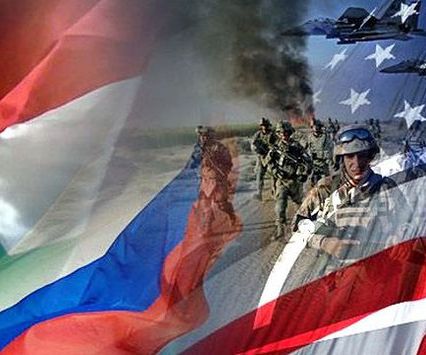 Article by Shehab and Maria Al Makahleh
Article by Shehab and Maria Al Makahleh
The competition between the United States and Russia in the MENA region will be determined after the end of the Syrian conflict.
The Middle East and North Africa (MENA) region is caught between the hammer of the US and the anvil of Russia. Russian-American competition has re-emerged in the region ever since Russian President Vladimir Putin turned his country into a global player in the 21st century. The show of power started with Ukraine in 2014 and Syria in 2015 and has since expanded.
It is difficult to predict the relationship between Moscow and Washington vis-à-vis the conflicts in Syria, Yemen and Libya, and the rift between Sunni Arab states and Iran. The trajectories of each conflict are the factors that will determine the relationship between Arabs and Moscow on one hand, and Arabs and Washington on the other.
The presence of international powers in MENA is nothing new. Both Russia and the US have been in the region as far back as the 18th and 19th centuries during the time of the Ottoman Empire. In the Gulf, the Americans cemented their relations with Oman in 1833, which led to the inauguration of the American Consulate in Muscat in 1838. However, the US affiliation with the Middle East is different from that of the Russians. Americans entered the region before there was turmoil, while the Russians arrived shortly after. Yet both countries have tried to exploit the current situation of unprecedented sectarianism and discernible regional and international competition. The Russians, however, know that America’s influence is far stronger.
Russians have always looked for access to warm waters. This has been their dream since Peter the Great in the 17th century. On the other hand, the Americans have military bases in the Middle East, mainly in the Gulf region. For example, the US Navy base in Juffair, Bahrain, was established in 1971 and was the first American installation in the region.
At the time, the Soviet Union had fallen far behind in the Middle East as it was focused on consolidating its gains in Eastern Europe and on rebuilding its empire following World War II. When Western countries established NATO in 1949 to ensure their security, the Soviets established the Warsaw Pact in 1955 for the Eastern Bloc. Soon after, the Americans helped form the Baghdad Pact in 1955 in attempts to thwart the Soviet influence in the Middle East. Since then, the Americans have dominated the region.
Putin Puts Russia on the Global Stage
The return of Russia as a global power is largely attributed to Putin. To achieve this goal, he had to vie for Russian interests and to challenge the American presence in the Middle East. Former US President Barack Obama tried to take a step back from the turmoil in the region as he shifted US foreign policy to focus on Asia. Putin exploited this by consolidating Russian interests in the MENA region because of its proximity to the Russian frontier.
Starting with the “counterterrorism operation” in 1999, Putin regained control over Chechnya. Then he had to confront NATO on Georgia in 2008. These situations were a warning to Washington and its allies: Moscow is back on track to become a global power, and Putin is different from former Russian President Boris Yeltsin.
Accordingly, Putin’s decision to support Syrian President Bashar al-Assad came after he considered the collapse of former Libyan leader Muammar Gaddafi’s regime under a NATO-backed civil war in 2011. Known for taking action, Putin came to the military support of Assad in 2015 as retaliation for the West’s role over unrest in Ukraine the year before.
Rivalry in the Middle East
Putin has pledged to challenge Western interests in the Middle East. Many countries in the region have started to regard Russia as an ascending power that can play a pivotal role in resolving regional issues. Recent visits to Moscow by the Jordanian monarch, the Saudi king and the Qatari emir, among others, are a clear signal that Russia is back on the block.
While Saudi Crown Prince Mohammed bin Salman has visited the US on recent occasions for talks on arms deals, Qatari Emir Tamim bin Hamad al-Thani took a trip to Moscow in February where discussions included military cooperation. Many from the Middle East are heading to the Kremlin to buy Russian weaponry, including the S-400 air missile systems.
All of this is a sign of Russia’s influence. Russian ties with the Gulf Cooperation Council have also progressed significantly in spite of the diplomatic crisis over Qatar. The rivalry between Iran and some Sunni Arab states has pushed Russia into the driver’s seat as the Americans negotiate mega arms deals — mainly with Saudi Arabia and the United Arab Emirates.
The American-Russian rivalry over the Middle East chessboard will be determined shortly after the end of the Syrian conflict. By then, there will be one of two scenarios: Either the Americans will have regained the influence they once had or it will be the Russians who take over.
Article published in Fair Observer:
Extremism and the search for identity in the Arab world
Written by Maria Dubovikova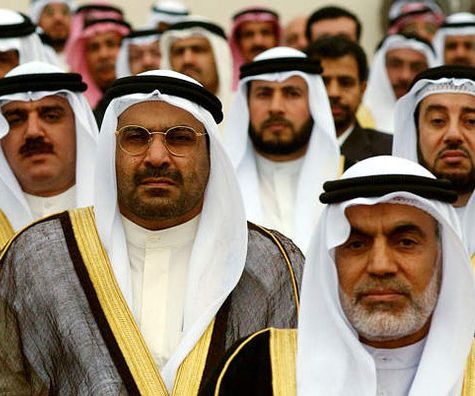 The 21st century presents Arabs with many challenges that affect their existence and identity for many years to come. Many scholars are now concerned about how to maintain their cultural identity without being dependent on the West who have the upper hand in terms of influence regarding educational and media systems due to the pervading globalisation which cannot be stopped or controlled.
The 21st century presents Arabs with many challenges that affect their existence and identity for many years to come. Many scholars are now concerned about how to maintain their cultural identity without being dependent on the West who have the upper hand in terms of influence regarding educational and media systems due to the pervading globalisation which cannot be stopped or controlled.
Though many Arab intelligentsias have written many articles and books about the need for independence in the face of the West’s superiority; however, the risks of westernisation of Arab and Islamic culture are uncontrollable and the influence will be directed against Arab-Islamic heritage and national cultural identity. Though globalisation can be viewed as positive, many scholars consider it negative as a sign of colonialism and cultural invasion, which threatens people’s identity and cultural individuality. Thus, the creation of Daesh in Iraq and Syria as well as al-Qaeda aimed not only to destroy the two countries’ armies but rather to destroy their cultural and historical heritage which leads to deconstructing national identity as well. Why Daesh has destroyed historical sites in Iraq and Syria?
The Arabs and Muslims are living in the middle of the world. Thus, they are under the influence of power polarisation or polarity. One would notice that Arabs at present are living in a state of displaced, intellectual dispersion, cultural disparity or a state of cultural reliance.
Nowadays, the youth are thinking of recreating the old glory and dignity of the caliphate era as they consider they have lost their identity in the so-called “conflict of civilisations”. They wanted to reconstruct a new state which unify them all under the slogan of Islam. This has been the trap for many of them by Daesh and al-Qaeda which have netted a web that misled the youth who fold-blindly followed the path of radicalism to revive the era of the caliphate.
Arabs and Muslims, mainly the youth, due to the high levels of unemployment, are thinking crystallising an ideological and intellectual project that accommodates them to revive their ancient glories. This message would overlap between Arabs and Muslims in terms of originality and modernity because many of the youth, if asked, would say that the past of the Arabs and Muslims was much better than the present era as they were influential and had a say and now they are influenced and have to obey what other nations dictate on them. Thus, they believe the way out is by getting back to the foundations of Islamic religion, though it is restricted by many conditions and determinants in our today’s world to better shape their political and economic future.
In other words, Muslims and Arabs are torn apart between Islamic identity and modern identity. They seek to follow the Islamic teachings and no to relinquish modern civilisation’s blessings. The principle of Islamic identity is one of the Islamic principles. It has enabled the nation's prosperity. Thus, to understand how the young seek extremism, one should know why they follow the teachings of Jihadist leaders in Afghanistan, Iraq, Syria, Libya, Yemen, Nigeria and elsewhere.
In Samuel. P. Huntington's thesis “The Clash of Civilizations”, the West will try to rule the world by permeating their notions and morals in other countries. Thus, the rejection to these plans comes from the young generation in the Arab and Muslim worlds as they are not bound to adhere to Western soul and ethics. Such rejection leads to a state of radicalism and a state of counter-acting against the interests of the west in the Arab and Islamic worlds or anywhere else. What turns the young Arabs and Muslims to be extremists then terrorist is the conflict between the West and their civilization in various terms including culture, economy, military, political and educational systems, values, beliefs, norms and traditions in addition to religion. Such difference are conducive to counteractions which would drive them to act against interests of the West, to insulate their communities from being penetrated by other civilizations not only the West, and to work on producing arms and weaponry that would create a deterrent power against any external threat such as the case with Daesh and al-Qaeda which both have their tactics and techniques to produce local-made arms.
Thus, linking historical identity with national interests is very significant to determine the moral perspective of extremists’ strategies and their way of thinking. Though political relations of conflicts, alliances and understandings between nations in the 21st century are important, Daesh and its affiliates as well as al-Qaeda and its affiliates do not consider this very important as long as they believe in unity of destiny and beliefs.
What Arabs and Muslims are facing now is their cultural identity issue at the global level. Jihadists realised that the main source of conflict in the next new world will not be political ideology or economics alone but also cultural. That is why they destroy all the ancient sites in the countries they take over. Therefore, the major conflicts will take place, according to the beliefs of these fanatic groups, between nations and groups belonging to different civilizations. It is a battle of civilizations to draw the new borders.
The outbreak of the so-called "revolutions" of the Arab Spring, which erupted in Tunisia, Egypt, Libya, Yemen and Syria, and the resulting identity struggle in an unprecedented manner, have led to hundreds of thousands of deaths and the migration of millions of citizens from their countries of origin to Europe, fleeing the inferno of “searching for an identity”, which none of those fighting for has a clear understanding what he is fighting for or who is he fighting. Syria may be a model for the bloody identity struggle, exacerbated by the battles of the superpowers and their deep rivalry over political influence.
In the end, there are social, cognitive and religious situations that may remain in the structure of a society and culture, and may provoke some clashes from time to time. However, at a historical moment and for multiple reasons, it could lead to a sudden abrupt transition from a state of equilibrium to a situation of bloody conflict between multiple parties in a bid to search for an identity.
Extended version of the article published in Arab News: http://www.arabnews.com/node/1295386
The significance of the upcoming Iraqi elections
Written by Maria Dubovikova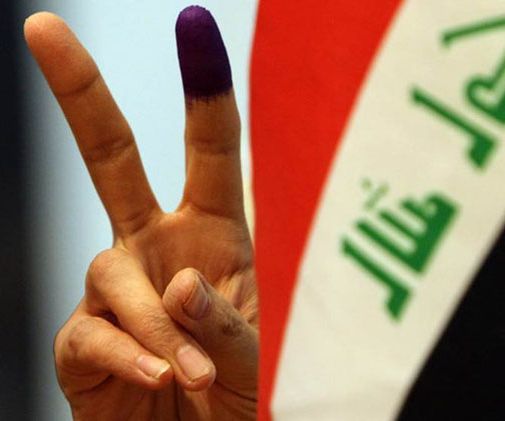 Campaigning began on Saturday ahead of the Iraqi parliamentary elections, which will be held on May 12. Some 7,000 candidates have registered to stand and will compete for 329 parliamentary seats. But how will the elections affect Iraq’s relations with its Arab neighbors?
Campaigning began on Saturday ahead of the Iraqi parliamentary elections, which will be held on May 12. Some 7,000 candidates have registered to stand and will compete for 329 parliamentary seats. But how will the elections affect Iraq’s relations with its Arab neighbors?
For the first time since the rise of Daesh, Iraqis across the country will be able to cast their votes at the ballot box. Voters will elect the representatives they want to guide the country out of its political, economic and security quagmire. Many candidates hope to return Iraq to its pre-1991 era, when the country led the Arab world in various fields. And with many countries in the Middle East supporting different candidates and blocs, regional players will be hoping for a result that best serves their interests.
After the US intervention in Iraq in 2003, many Arab countries chose a state of non-interference in Iraqi affairs, but they may have paid a heavy price for this policy of self-restraint, as it allowed Iran to extend its influence in Iraq. In spite of this, key regional players like Saudi Arabia are now seeking to reactivate the relationship between the two countries in an effort to achieve common political, security and economic goals.
Iraq’s Arab neighbors are possibly seeking to take advantage of the opportunity brought about by strained US-Iranian relations under the Trump administration in order to restore the days when they had a presence in Iraqi politics. They hope to regain influence in Iraq to protect their interests and security, since the country has become an almost exclusive arena for Iranian influence.
In security terms, Iraq is now ruled by opponents of the regime of Saddam Hussein, most of whom have returned from exile in Iran. The country’s neighbors may now seek to strengthen their relations with the Iraqi government in order to protect their borders and to limit Iran’s ability to influence factions against their interests.
Many candidates hope to return Iraq to its pre-1991 era, when the country led the Arab world in various fields.
– Maria Dubovikova
The Iraqi governments since 2003 have disrupted their relations with neighboring Arab countries in favor of Iran. Iraq has suffered a lot through sectarian wars, the proliferation of violence and terrorism, and the conflict between its rival political camps, depriving the country of stability and development. Now, Iraqi leaders believe that a development of the relationships with its neighbors will positively affect Iraq and pave the way for it to regain its status among Arab countries.
The Iraqi government is almost entirely isolated in the Arab world because of the Iranian influence in its politics and military. Therefore, Baghdad hopes to develop bilateral relationships to obtain an effective regional presence. Prime Minister Haider Abadi, in particular, is seeking gains to reflect positively on his future and against his rivals.
Iraq is also suffering from the negative effects on its economy of the continued restrictions on its borders with Saudi Arabia and Syria. Iraq’s poor infrastructure and the deterioration of its economic conditions have impacted the social stability of its citizens and their relationship with the government. The more stable Iraq is, the more economic benefits its people will gain from open borders with their direct neighbors.
But challenges may hinder the development of Iraq’s relations with its Arab neighbors, some of which may be constrained by the negative image created during the recent past that Iraq is under the influence of non-state actors and Iran. The presence of armed militias loyal to Tehran is a major challenge.
Relations between Iraq and the rest of the Arab world are still in the process of normalization, reconciliation and the resolution of problems. Confidence-building measures would be welcome, as well as developing and strengthening their cooperation. The development of Iraqi-Arab relations depends largely on Baghdad’s post-election desire to develop these ties and reduce the influence of Iran within its borders.
Article published in Arab News: http://www.arabnews.com/node/1287166
Rationality and the Delegitimization of Mahmoud Abbas
Written by Walid Salem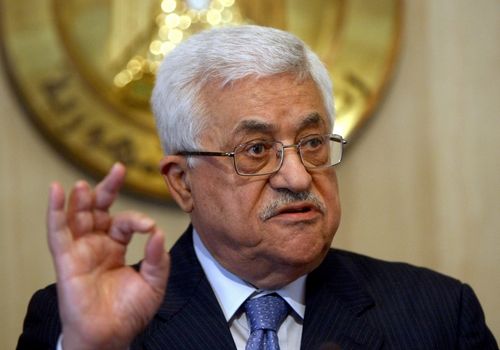 The thesis of this short column, can be summarized in the message that the leaders of the underdog party in a protracted and intractable conflict cannot be expected to act all the time rationally( as versus to emotions as the term is unusually used in the political discourses), regardless of the context and its history. And also regardless of the General and the overall positions of those leaders.
The thesis of this short column, can be summarized in the message that the leaders of the underdog party in a protracted and intractable conflict cannot be expected to act all the time rationally( as versus to emotions as the term is unusually used in the political discourses), regardless of the context and its history. And also regardless of the General and the overall positions of those leaders.
On this basis, one can look to the last statement of the Palestinian President Mahmoud Abbas in the opening of the Palestinian National Council of the PLO ( The PNC) in the 30th of last April considering the “ Jewish usuary” as the reason for their hate and therefore the successive killings in Europe.
This statement was reviewed and received as separate from the context( The status of the conflict), the personality of Mahmoud Abbas as a man of peace who also presented his last peace plan to the UN General Assembly In the fall of last year, followed by presenting it in his speech to the EU in Brussels last January this year, then to the Arab Summit in Dhahran of Saudi Arabia in 15th of April, and last but not least in the PNC meeting few days ago.
His plan included a call for an international conference to be held under the international legitimacy and run by an international collective mechanism to reach a solution to the Israeli Palestinian conflict.
The plan was strongly welcomed by the EU, Russia, China, Brazil, the Organization of Islamic Cooperation, most of the non- aligned countries, and finally it was adopted by the Arab last Summit, and last PNC Conference, and became part of their resolutions.
The only two countries who strongly reject Abbas peace plan are the United States, and Israel.
Obviously all know the answer of why is that?. Briefly both of them do not have a peace plan that is capable to achieve peace between the Palestinians and the Israelis. The details are known and were discused through an immense number of articles written by many observers.
The writer of this column has his reservation on Abbas peace plan, based on the fact that instead of just demanding the world for it’s implementation, we should first create our comprehensive and continuous Non- Violent Intifada in order to make the world adopting the plan. Nevertheless the striking question for this column is: Why Abbas “ irrational” statement was stripped from its links to the history of the conflict, its context today, and also from the personality and the history of Abbas himself as a man of peace?.
This question is two-fold: In one hand, why this “ Stripping” process came out as a consensus among the world major powers?. Why as a result there were a series of strong statements against Abbas without mentioning( at least by those that supported his peace plan), even that he is a man of peace, and putting his “ mistake” Within this overall “ evaluation” of him?.
The answer for these questions, goes to the Western conceptualization of “ who is the moderate” among the underdogs in the conflicts, presented all the time as the person who is completely rational, and as a one that is not expected to do even any single “mistake” of following his/her emotions. If he or she did that mistake, even once, it will be then enough to start the process of his/ her Politicide by legitimizing him among his/her people and internationally.
This takes us to the second part of this question, which is why the two former charismatic leaders of the Palestinians were deligitimized at the end?. These two are The Mufti Haj Amin Al Husseini, the head of the Pre- 1948 Arab High Commitee( and later the Arab High Commission), and the second is Yaser Arafat.
The first escaped detention by the British in the 1930’s due to his role in the 1936 revolution in Palestine by escaping to Iraq, and then to Iran when the British Forces were back to Iraq during the World War Two, and finally he found himself escaping from Iran to Berlin the capital of the Nazi Germany when the British occupied Iran. He found a shelter in the Nazi Germany but all the respectful and non demagogic studies will tell that he did not become an advocate to the Nazi ideology. So why he was deligitimized?. The same goes to Yaser Arafat the signatory of Oslo Declaration of Principles of 1993, and the man of peace together with Yitzhak Rabin. After his rejection of 2000 Camp David American offered deal, he found himself imprisond in his compound in Ramallah by the Israeli right wing Government , till he died.
One to think of these two cases, and then speculating: Are the Palestinian leadrs are expected to follow all the time to line of the great power, and to expect punishemt and ousting from the “ moderation” category when they do not do? Are we accordingly witnessing the process of delegitimizing now Mahmoud Abbas after he showed his objection to the American” Ultimate plan” that do not solve any of the issues of refugees, Jerusalem, settlements, borders, and others?. Is this a formula to move him out of the “ moderation” category? Is it the fate of the Palestinians to continue having an ethnocide combined with a politicide of their political leadership through all their modern history?. Will be there a real peace plan to be implemented so this fate to be transformed?.
In the same Line: Are the statements against Abbas stripped from all what mentioned helpful in path to prevent the delegitimization of Abbas? are they rational by themselves, or just reactions of anger by some , and instruments to deligitimize Abbas by others? what are the level of “ tolerance” given to the underdog in a conflict by those who are” stereotyping” him/ her?, and when the patronizing part of this stereotyping will be removed?. Finally how these condemnations to Abbas will not objectively leads to the strengthening of the Israeli settler colonial project on the expense of the Palestinians?
Special to Akhbar Elbalad
More...
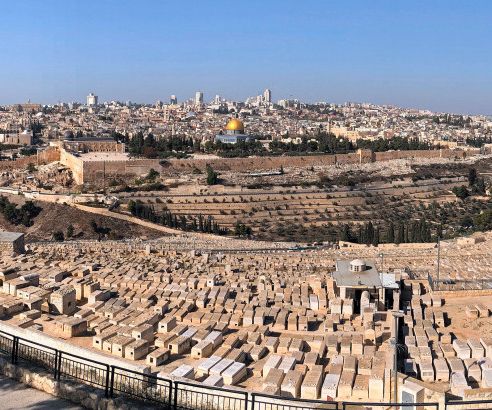 The Arab Summit held in Saudi Arabia in the 15th of April, passed this year without attracting the media attention. Strong decisions about Palestine and Iran, and a deep split regarding Syria.These are in general the summit resolutions.
The Arab Summit held in Saudi Arabia in the 15th of April, passed this year without attracting the media attention. Strong decisions about Palestine and Iran, and a deep split regarding Syria.These are in general the summit resolutions.
Jerusalem wise the summit was called by King Salman as “ AlQuds Summit”, with 150 million dollars allocated by Saudi Arabia to the Islamic Endownment in the city, and other 50 million allocated to the UNRWA. As happened with the previous summits financial support decisions, one has to wait and see if these will find their way to implementation this time. The Palestinian Ministry of Foreign Affairs sent a letter to the summit after its end, calling for a mechanism to implement the summit decisions. We will wait and see.
In Israel, there were almost no response to the Arab Summit resolutions. The Israeli plans in regard to Jerusalem continued as if nothing happened. Besides that some Israeli voices who consider them seleves as “ Peace makers”, moved from their previous patronizing position of giving “advisory opinions” to the Palestinians about alternatives to what is called as “ the failure of the Palestinian strategies for Jerusalem in the last fifty years”, to a new worse position of creating a list for joining the Israeli upcoming municipal elections of this year. This participation is taking place in the framework of the Israeli annexation to the city, and practically recognizing it, by looking for the improvement of the daily life issues of the Palestinians in East Jerusalem through this system instead of working to support the creation of Palestinian facts in the ground towards Palestinian self determination. Interesting enough this new “ project” is presented under the slogan of “ the people democratic right to vote”, as if this democratic participation cannot be achieved by bringing back the Palestinian Municipality that was dissolved illegally by Israel in 1967, and by allowing for the Palestinian munici elections in
West Bank and Gaza Strip to be inclusive to East Jerusalem the capital of Palestine.
This development in the year of moving the American Embassy to Jerusalem, will only create within the existing asymmetry an inclusion process of the Palestinians in the Israeli system, that it besides creating fragmentation among the Palestinians instead of supporting by practical means their right to self determination and independence.
The problem to the Palestinian Jerusalemites with the Arabs are those of that they are making slogans about supporting, but practically speaking the Arab support is fragmented, compitative between different Arab Countires, and also the support that arrives is very small.
The problem of the Palestinian Jerusalemites with the State of Palestine Authorities is about the latter inability to start acting as a Palestinian State in the ground, with East Jerusalem as its capital, which will include the implementation of practical economic and community based programs in Jerusalem, and also include the creation of a long term nonviolent resistance. Now the Jerusalemites are looking to the Palestinian National Council of the 30th of April to make a crucial steps in that direction. Can it?
The big problem for the Palestinian East Jerusalemites will still to be the ISRAELI OCCUPATION, and its ongoing plans for the deepening of the Israeli settler colonial project in the city. Reading the mentioned list for municipal elections program one will find that occupation is not mentioned, and as well the right of the Palestinians to have back their dissolved 1967 Municipality is not mentioned. Moreover the list program ignores the fact that most of the decisions regarding the Israelization and the Judaization of Jerusalem are taken in the Israeli Ministerial level rather than the municipal level. Do they want to be “ witnesses” ( if they succeeded in the municipal elections) on the settlements expansion and the humiliation against the Palestinians in East Jerusalem, including for example the humiliation taking place in the offices of the Israeli Ministry of Interior in East Jerusalem?
Yet, this is not all the story, but there is an ethical side of it that still to be tackled: Opposite to relativism which considers every point of view as merely an “ Opinion”, and therefore considers all opinions as all legitimate and equal regardless of the divide, the Israeli so called “ Peace activists” are called to make the courageous move from this “ Neutrality”, to the position of the the ethical support of what their Palestinian partners struggle for. Without this move, talking about struggling together become impossible, and the joint ventures become like a waste of the Golden time in controversies and arguments on the expense of taking actions.
Finally, despite all these pressures and others not mentioned on the Palestinian East Jerusalemites, there are lights in the horizon, the last was the decisions of the economic conference in Istanbul last week, and others. More importantly there is the Palestinian strong sense of integrity, and the resilience and the ongoing community development in the East Jerusalem communities, which make the Palestinian East Jerusalemite steadfast, continue and prosper despite all the odds.
Article published in Akhbar Al Balad
Photo credit: AFP/Getty Images
Whatever happened in Douma, an invasion is not the answer
Written by Maria Dubovikova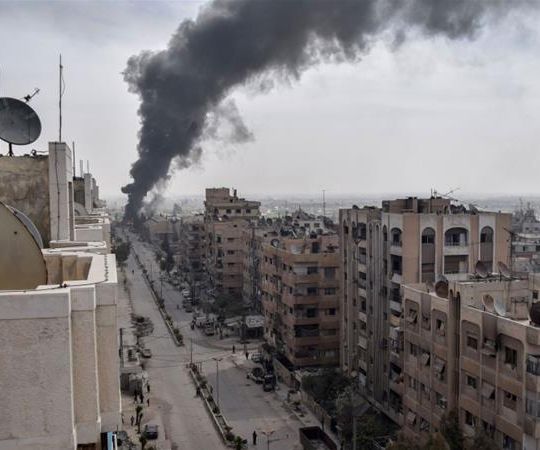 Who benefits from a chemical attack such as the one reported to have taken place in Douma last weekend? Is it Russia or Syria? Hardly. It was already clear that any such attack would provoke a tough response from the US and its allies — direct military involvement in Syria with the aim of punishing Bashar Assad, his forces and allies, and ultimately toppling the regime.
Who benefits from a chemical attack such as the one reported to have taken place in Douma last weekend? Is it Russia or Syria? Hardly. It was already clear that any such attack would provoke a tough response from the US and its allies — direct military involvement in Syria with the aim of punishing Bashar Assad, his forces and allies, and ultimately toppling the regime.
The alleged attack raises many questions, the most important being the timing; there was no reason for the Assad regime to carry it out. The Syrian and Russian armies had recaptured most of Eastern Ghouta. Russia was in talks with the militant group Jaish Al-Islam over a deal to allow their fighters to leave Ghouta for Idlib. Civilians trapped in Ghouta had been released.
Videos reporting the supposed attack do not stand up to scrutiny. One shows a reporter filming as he goes down into the shelter where it took place, but without taking any precautions or wearing any protection. Later, another White Helmet appears with a mask, and says the place is full of gas. Is this logical? Then the White Helmet puts on a mask, but with his bare hands, in ordinary clothes and with his neck uncovered. If there was a chemical attack, how is this possible?
The White Helmets also reported that most of the victims of the attack were in an underground shelter. But Assad was accused of dropping barrel bombs filled with toxic gas. If this were true, most of the victims would have been at ground level. In addition, Russian military personnel in Douma were not affected by any kind of chemical poisoning, and an investigation by the Russians found no traces of chemical weapons.
An investigation should be carried out first by the Organisation for the Prohibition of Chemical Weapons and other independent international bodies. The stakes are enormous because for Assad to carry out such such an attack would be to commit suicide. He is surely not naive enough to fall into this trap.
There are genuine concerns about what happens next. Any military retaliation without a detailed investigation, on the sole basis of reports from the White Helmets, would be an attempt to change the course of recent developments in Syria, and deprive Russia and Turkey of their achievements on the ground.
The ramifications are enormous, and the price of military intervention may be too much to bear. The examples are clear: The military intervention in Iraq cost hundreds of thousands of Iraqi lives, and led to the emergence of Daesh. The operations to liberate Mosul and Raqqa also cost thousands of civilian lives. We can hardly calculate how many lives would be sacrificed if the West’s aggressive declarations were followed through, or how long that road to hell would be.
A full-scale attack, as was the case with Libya, would lead to terrorist and extremist gangs spreading all over Syria and the region, leading to chaos and anarchy. Furthermore, we would stand on the brink of a direct confrontation between two nuclear powers, Russia and the US. Nobody would be able to count the innocent victims of such a confrontation.
Article published in Arab News: http://www.arabnews.com/node/1283061
Photo credit: Anadolu
The impact of Pyongyang-Washington talks on Tehran
Written by Shehab Al Makahleh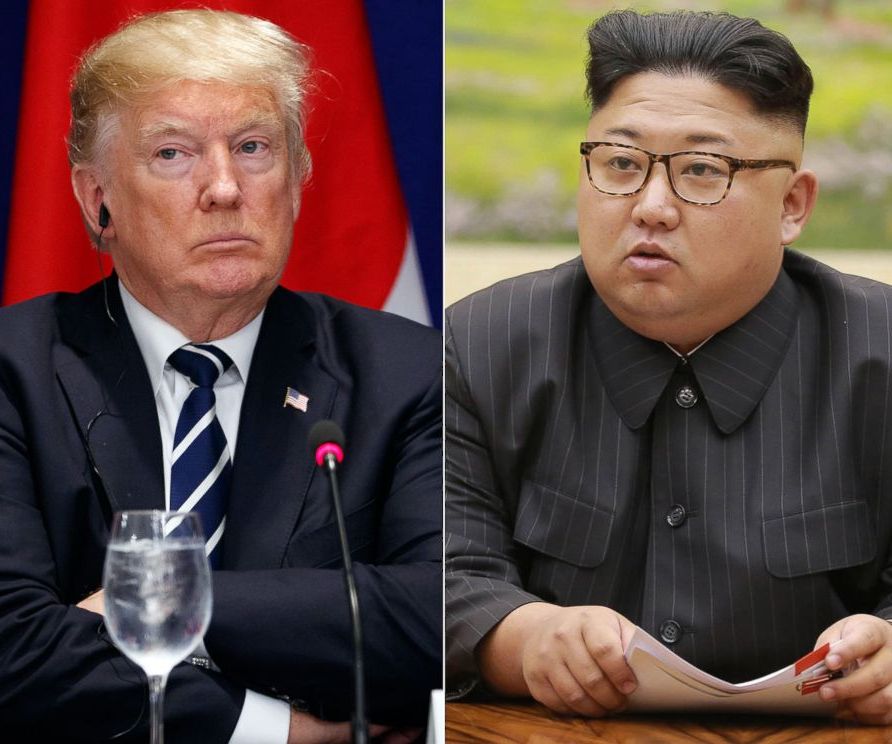 From March 25 to 28, North Korean leader Kim Jong-un paid a sudden visit which surprised the world; however, some world leaders and heads of states have lauded the visit as a step towards defusing tension between North Korea and the US. The United Nations hailed the trip: “The latest positive developments are the beginning of a longer process of sincere dialogue, leading to sustainable peace and denuclearization on the Korean Peninsula, while the White House said: “We’re going to be cautiously optimistic, but we feel like things are moving in the right direction.”
From March 25 to 28, North Korean leader Kim Jong-un paid a sudden visit which surprised the world; however, some world leaders and heads of states have lauded the visit as a step towards defusing tension between North Korea and the US. The United Nations hailed the trip: “The latest positive developments are the beginning of a longer process of sincere dialogue, leading to sustainable peace and denuclearization on the Korean Peninsula, while the White House said: “We’re going to be cautiously optimistic, but we feel like things are moving in the right direction.”
Whether the trip was a signal to the Americans or not, the coming few weeks will reveal that North Korea will not talk about its ballistic capabilities and nuclear powers at a time Washington imposes new taxes on China. The talks are mere political to give the US a signal not to tamper with the current trade status between Washington and Beijing as the key to Kim is in China and not in the US. The general picture of Chinese-North Korean leaders’ talks have left no qualm that Beijing has mediated between Pyongyang and Washington.
Signals of Kim-Xi meeting
Observers do believe that the talks between Kim and the Chinese President People’s Republic of China Xi Jinping aimed to give Washington a signal that only Beijing’s efforts can bring peace to the Korean Peninsula as China has the upper hand for the projected meetings with the leaders of South Korea (end of April) and the US (in May).
Regardless of the North Korean desire for denuclearization, the Chinese have benefitted from the timing of the visit to give various messages to the US and to the West that only China can have an influence on Kim and that whoever seeks to negotiate with him should first talk to China. The visit has helped China to have a leverage in a sense on the North Korean issue. This is clear when Xi proposed talks about some points during his meeting with Kim to settle the issue on the Korean Peninsula.
The first point which was proposed by Xi was that diplomacy is the breakthrough of the American-North Korean conflict. Beijing has been insisting to bring all talks under the United Nations Security Council’s umbrella and to bring the parties concerned to the negotiations table. As both considered this option, the pivotal role China is playing regarding the denuclearisation is based on what Kim has pledged if the Americans and South Koreans respond positively to his initiative with good will.
The second is that China and North Korea agreed to resume their long-time traditional relationship, including state-to-state and party-to-party ties, giving American side that the Chinese can proceed further to cement their ties with the North Korean if the US fails to accept the Chinese proposal to settle the issue peacefully. To improve the Sino-U.S. relations, Beijing finds a way to solve the issue between Washington and Pyongyang in peaceful means and to disarm North Korea from its nuclear technology.
Though the Americans did not copiously appreciate what the Chinese are doing as they don’t like others to twist their arm, especially Beijing which attributes to itself the laurels of convincing Kim to reconsider peace talks with South Korea and with the Americans to avoid any nuclear escalation in the region, the Chinese are cautiously addressing means to exercise excessive pressure on North Korea, which Beijing uses as a card against Washington, Japan and other enemies in the region.
The visit of the North Korean leader comes at a time the American President Donald Trump reshuffled some leading positions at his administration which included the appointments of Secretary of State Mike Pompeo and National Security Advisor John Bolton to reinforce the hawkish stance against China and Russia. The Xi-Kim meeting demonstrates that China is forming stronger ties with North Korea, demonstrating that any meeting between Trump and Kim will be a meeting with a North Korean president backed by China.
In other words, the US will not be able to deprive Pyongyang of its most lethal weaponries because both Pyongyang and Beijing will ask for serious guarantees that the Americans will not deceive them. Thus, both will ask for concessions from the American administration first and after that they will consider disarming North Korea from its strategic weapons gradually. Russia, of course, backs China and North Korea in their demands.
The impact of Pyongyang-Washington scenario on Tehran
The North Korean status quo would have also an impact on the Iranian weaponry and ballistic missiles as well. Iran is expecting that Trump will rip up the nuclear deal in May; the North Koreans are also watching closely to see how the Americans are dealing with their deals with other countries and how this would affect any future deal between Pyongyang and Washington to settle the military threat North Korea poses on other countries.
Despite the fact that the Americans are still a key player in the Pacific Ocean, the Chinese are the only ones who can have the big say on Kim to dissuade him from his nuclear ambitions by militarily securing North Korea from external threats. What applies to North Korea applies to Iran. The only guarantor to the security and stability of Iran will be its allies: Russia and China. Thus, the talk about another deal with Iran goes through Moscow and Beijing before it goes to Tehran.
The issue of North Korea is its proximity to the American territory and its Pacific fleet at a time China considers North Korea as one of its provinces. Iran is deemed another threat as it has the North Korean ambitions which are a source of threat to the stability of the Greater Middle East. In both cases, China has a big say.
Article published in Geostrategic media: http://geostrategicmedia.com/2018/04/05/the-impact-of-pyongyang-washington-talks-on-tehran/
April Arab Summit decisive and at critical time
Written by Shehab Al Makahleh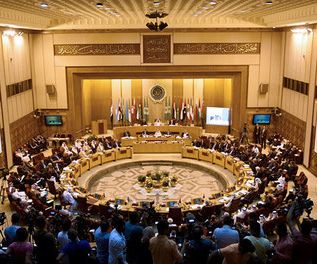 The 29th Arab League Summit which will be held in Riyadh on April 15th is taking place at volatile Arab and international atmospheres, amid sharp Arab divisions and disagreements. In the midst of various dangers the Arab countries are facing due to the repercussions of the so-called “Arab Spring” in some Arab countries and political rifts regarding some regional issues, the summit is slated to draw a “road map” for the coming era.
The 29th Arab League Summit which will be held in Riyadh on April 15th is taking place at volatile Arab and international atmospheres, amid sharp Arab divisions and disagreements. In the midst of various dangers the Arab countries are facing due to the repercussions of the so-called “Arab Spring” in some Arab countries and political rifts regarding some regional issues, the summit is slated to draw a “road map” for the coming era.
The summit in Riyadh, which will be preceded by several preparatory meetings due as of April 9, would be different as it comes after the Saudi Crown Prince Mohammad bin Salman concludes his visit to the US, where Saudi Arabia is trying to push the American administration to fill the vacuum that was deepened by the failure of its previous pull-out strategy from the region. The Arab summit will be held at very delicate conditions, amid great regional and international challenges, with internal threats of some groups that are supported by foreign countries which would pose a major threat to all Arabs. In the midst of the repercussions of incidents in Yemen, Syria, Iraq, Libya and Egypt, Arab leaders will have to find a way out to end their schism that hampers the solution of many pending issues.
The most important topic will be the Palestinian issue and the frantic attempts to liquidate it by some foreign powers proposing risky projects, ending the dream of Palestinians of a state with Jerusalem as its capital. This means the abolition of the right of return to Palestinians that would lead to Judaization of Jerusalem with all its religious and spiritual significance to Muslims and Christians.
The performance of the Arab League is on the table of Arab leaders as it has become a must to develop the performance to meet the aspirations of Arabs since the league has mostly failed to solve many Arab issues since its establishment on March 22, 1945.
The timing of the summit is important as it comes in the aftermath of the Saudi Crown Prince Mohammad bin Salman’s visit to the US and his meetings with American officials. Such a summit will pay dividends in regime gaps between Arab countries and USA regarding some regional issues to rally around against Iran.
The delay of the summit from March to April is attributed for two major reasons: Saudi Crown Prince’s visit to the US and the presidential elections in Egypt (March 26-28), 2018. Thus, since Egypt has witnessed presidential elections, it has been important to wait and see the outcome to determine the new regional approach towards many regional issues and conflicts.
After the return of the Crown Prince of Saudi Arabia to Riyadh, many deliberations will start among Arab states, which would be conducive to a proposal of a different creature of the Arab League. The question is: Will there be a unified stand towards some regional issues and conflicts starting from Syria, Yemen, Libya, the Palestinian-Israeli conflict? What is the trajectory of the Arab League towards Iran?
It is not expected that Arabs will be united on all issues, especially Syria and Iran, However, the trajectory of the league coalescing around an anti-Iranian platform is growing after American President Donald Trump’s decision to re-address the nuclear deal with Iran by either adding new items that prevent Iran from producing ballistic missiles or by ripping up the deal by May 2018, with proposals to impose new sanctions on Iran for interfering in Arab affairs and posing threats to its neighbors.
The outcome of Riyadh Summit will be a continuum of the previous one held in Amman in March 2018, calling for restarting of stalled peace talks between Israelis and Palestinians on a two-state solution based on 1967 borders, with a focus on the Trump’s recognition of Jerusalem as Capital of Israel.
The coming summit is critical as the focus will be on means to counter terrorism, and to tackle political, economic, social issues of concern to Arab states. Beyond the veneer of sanguine statements, it is projected that the summit will bring closer the Arab countries at first hand, then bring them closer to the US to proceed with the coming regional transformation process of their societies in a bid to jointly confront extremism and terrorism and Iranians expansionism despite the fact that some Arab states would be conservative when dealing with Iran.
The leaders will advocate regional and international security. They will also focus on the hostile positions of the Iranian regime and the continued interference in Arab internal affairs in flagrant violation of international law and the principles of good-neighborliness, warning of the risk of Iranian ballistic missiles on the stability of the Middle East region. They will be calling for a joint action to protect regional waters and to combat piracy which adversely affect the commercial movement and economic growth of the region, with a call for combatting organised crime and drug smuggling
The Riyadh Summit will be an enhancement of the former Arab-Muslim-American Summit which was held May 21, 2017 in Saudi Arabia to further build a close partnership between Arab and Muslim countries and the US to achieve peace, stability and development regionally and internationally.
Observers here in Washington believe that the summit will draw up a “road map” for the leaders to consolidate relations and joint action on issues of common interest. The summit will recommend promoting coexistence and constructive tolerance among different nations, religions and cultures, with clear rejection of any attempt to link terrorism with any religion, culture or race.
Will we witness a new form of Arab League to be formed after the coming summit to better serve Arab interests and causes? Will we see a new coalition against Iran supported by the US? These questions are almost the part of the mission of the Saudi Crown Prince in the US.
Article published in Geostrategic Media: http://geostrategicmedia.com/2018/04/03/april-arab-summit-decisive-and-at-critical-time/











